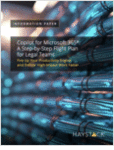The Supreme Court’s recent unanimous decision in Grable & Sons Metal Products, Inc. v. Darue Engineering & Manufacturing, 125 S. Ct. 2363 (2005), put to rest almost 20 years of uncertainty regarding the scope of federal question jurisdiction. Responding to a split within the Courts of Appeals, the Supreme Court at long last addressed its holding in Merrell Dow Pharmaceuticals Inc. v. Thompson, 478 U.S. 804 (1986), that continued to baffle lower federal courts and legal scholars – namely, whether Merrell Dow required a federal cause of action as a condition for exercising federal question jurisdiction. Grable & Sons not only responded with a resounding “no,” concluding that federal question jurisdiction does not require a federal private right of action, but it also reaffirmed the Court’s longstanding commitment to the broader and more flexible Smith v. Kansas City Title & Trust Co., 255 U.S. 180 (1921), approach to federal question jurisdiction.
This article provides the background for the Grable & Sons decision and examines the Court’s opinion. It then discusses the likely post-Grable & Sons battleground and assists defense counsel in positioning their cases to better ensure a federal forum for federal question cases.
This content has been archived. It is available through our partners, LexisNexis® and Bloomberg Law.
To view this content, please continue to their sites.
Not a Lexis Subscriber?
Subscribe Now
Not a Bloomberg Law Subscriber?
Subscribe Now
LexisNexis® and Bloomberg Law are third party online distributors of the broad collection of current and archived versions of ALM's legal news publications. LexisNexis® and Bloomberg Law customers are able to access and use ALM's content, including content from the National Law Journal, The American Lawyer, Legaltech News, The New York Law Journal, and Corporate Counsel, as well as other sources of legal information.
For questions call 1-877-256-2472 or contact us at [email protected]




